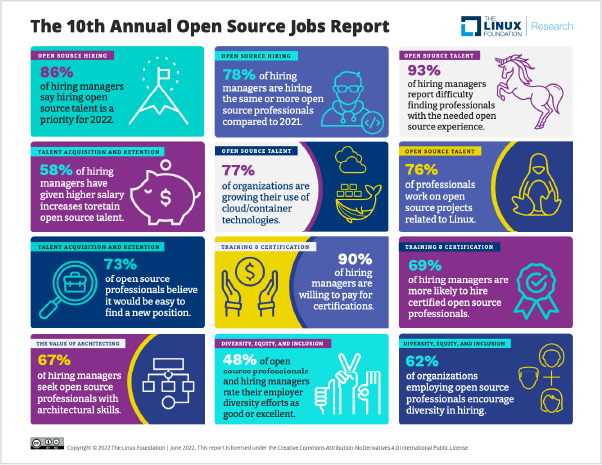LINUX FOUNDATION RESEARCH
We’re investigating the impact of open source collaboration to solve the world’s most pressing challenges.

About LF Research
Pathways to Cybersecurity Best Practices in Open Source
This case study report from the Linux Foundation investigates the impacts of the Cyber Resilience Act on open source software.

Participate in Our Research
Interested in conducting research?
Review our prospectus for more information, and email us at research@linuxfoundation.org

The 10th Annual Open Source Jobs Report
Download ReportAbstract
According to 93% of the hiring managers surveyed, open source talent is increasingly difficult to find. As a result, companies are now turning towards training their staff in new cloud automation, orchestration, and developer productivity tools to close that gap as much as possible – and where they cannot train their staff or find adequate new hires, they’re hiring consultants to avoid delaying important projects.
This year the Linux Foundation once again teamed up with edX to produce the 10th Annual Open Source Jobs Report to shed light on these changes and challenges. This year’s study, which is the most comprehensive yet, includes survey findings and analysis generated from more than 1,900 open source professionals, in addition to 500 individuals with responsibility for hiring such professionals.
In addition to our findings on employee retention, the report contains practical information on the state of open source talent that employers may use to guide their hiring, training, and diversity awareness efforts. It also provides IT professionals with clear, unbiased insights on which skills are most marketable.
Key Findings
There remains a shortage of qualified open source talent: The vast majority of employers (93%) report difficulty finding sufficient talent with open source skills. This trend is not going away with nearly half (46%) of employers planning to increase their open source hiring in the next six months, and 73% of open source professionals stating it would be easy to find a new role should they choose to move on.
Compensation has become a greater differentiating factor: Financial incentives including salary and bonuses are the most common means of keeping talent, with two-in-three open source professionals saying a higher salary would deter them from leaving a job. With flex time and remote work becoming the industry standard, lifestyle benefits are becoming less of a consideration, making financial incentives a bigger differentiator.
Certifications hit new levels of importance: An overwhelming number of employers (90%) stated that they will pay for employees to obtain certifications, and 81% of professionals plan to add certifications this year, demonstrating the weight these credentials hold. The 69% of employers who are more likely to hire an open source professional with a certification also reinforces that in light of talent shortages, prior experience is becoming less of a requirement as long as someone can demonstrate they possess the skills to do the job.
Cloud’s continued dominance: Cloud and container technology skills remain the most in demand this year, with 69% of employers seeking hires with these skills, and 71% of open source professionals agreeing these skills are in high demand. This is unsurprising with 68% of companies surveyed reporting they grew their use of cloud in the past year. Linux skills remain in high demand as well (61% of hiring managers) which is unsurprising considering how much Linux underpins cloud computing.
Cybersecurity concerns are mounting: Cybersecurity skills have the fourth biggest impact on hiring decisions, reported by 40% of employers, trailing only cloud, Linux and DevOps. Amongst professionals, 77% state they would benefit from additional cybersecurity training, demonstrating that although the importance of security is being recognized more, there is work to be done to truly secure technology deployments.
Companies are willing to spend more to avoid delaying projects: The most common way to close skills gaps currently according to hiring managers is training (43%), followed by 41% who say they hire consultants to fill these gaps, an expensive alternative and a significant increase from the 29% reporting this last year. This aligns with the only 16% who are willing to delay projects, demonstrating digital transformation activities are being prioritized even if they require costly consultants.
Authors
- Linux Foundation Research Team
- Foreword By Clyde Seepersad, SVP & General Manager, Training & Certification, The Linux Foundation
Additional Resources
DOI: 10.70828/RZRE1873
Our Team
Filter by:
Hilary Carter
SVP, Research
Hilary Carter joined the Linux Foundation in 2021 to launch and lead LF Research, established to deliver empirical insights into open source trends, opportunities, and challenges. Prior to joining the Linux Foundation, Hilary led a global, syndicated research institute focused on blockchain technology based in Toronto, Canada. She has authored and led nearly 200 research projects focused on open source innovation and its adoption across industries. Hilary holds a Master of Science in Management from the London School of Economics, and holds dual Irish and Canadian citizenship.

Stephen Hendrick
VP, Research
Steve Hendrick is VP of Linux Foundation Research. He has expertise in developing content and services to support product development, product positioning, marketing, business strategy, and messaging. Steve is a subject matter expert in application development and deployment topics, including DevOps, application management, application platforms, and middleware. He has authored comprehensive primary research publications and provided advice and support for some of the world’s most prominent software vendors and Fortune 100 enterprises.
Before joining The Linux Foundation, Steve was a Research Director and Principal Investigator at Enterprise Management Associates (EMA). Steve acquired his experience in application development at Chase Manhattan Bank, Interactive Data Corp, Dynamics Associates, and Charles River Associates.
Steve received a B.A. in economics from Hartwick College and an M.B.A. from Boston University.
Adrienn Lawson
Data Analyst
Adrienn is a data analyst at the Linux Foundation. She obtained a Master’s degree from the University of Oxford in Social Data Science. She supports LF Research with survey development, analysis, and report writing. Adrienn has previously conducted research at the University of Oxford, the Budapest Institute for Policy Analysis, and the U.K.’s Office for National Statistics.
Anna Hermansen
Research & Ecosystem Manager
Anna is the Ecosystem Manager for LF Research where she supports end-to-end management of the Linux Foundation's research projects. She has conducted qualitative and systematic review research in health data infrastructure and the integration of new technologies to better support data sharing in healthcare. She is a generalist with experience in client services, program delivery, project management, and writing for academic, corporate, and web user audiences. Prior to the Linux Foundation, she worked for two different research programs, the Blockchain Research Institute and BC Cancer's Research Institute.

Lucian Balea
RTE
Lucian is Open Source Program Director at RTE, the French power transmission system operator. He is leading the open source strategy of RTE which aims at moving the digitalization of the power grid into a new era. Early 2018, he started a collaboration with The Linux Foundation to launch LF Energy, an open source coalition to speed technological innovation and support the energy transition across the world. Today, Lucian is deeply involved in LF Energy and serves as Chair of the Governing Board.
Lucian has been with RTE since 2003 where he held several management positions in the fields of R&D, markets and finance.

Kathy Brost
Intel
Kathy Brost is a Technology Strategist in the Office of the CTO organization at Intel Corporation. She has over 30 years of experience as a research professional at leading technology organizations. Prior to Intel, Kathy worked at Siemens Digital Industries Software and Microsoft and earned a Master of Library and Information Science degree from the University of Washington.

Henry Chesbrough
UC Berkeley
Henry Chesbrough is best known as “the father of Open Innovation”. He teaches at the Haas School of Business at the University of California-Berkeley, where he is the Faculty Director of the Garwood Center for Corporate Innovation. He is also Maire Tecnimont Professor of Open Innovation and Sustainability at Luiss University in Rome. Previously he was an Assistant Professor at Harvard Business School. He holds a PhD from UC Berkeley, and MBA from Stanford, and a BA from Yale University. He has written books such as Open Innovation (Harvard Business School Press, 2003), Open Business Models (Harvard Business School Press, 2006), Open Services Innovation (Jossey-Bass, 2011) and Open Innovation Results (Oxford, 2020). His research has been cited more than 90,000 times, according to Google Scholar. He has been recognized as one of the leading business thinkers by Thinkers50. He received an Innovation Luminary award from the European Commission in 2014. He received the Industrial Research Institute Medal of Achievement in 2017, and has two honorary doctorates.

Jerry Cuomo
Fellow, IBM
Jerry is a retired IBM Fellow with more than 38 years' experience as a software innovator and open-source advocate. He currently lectures at North Carolina State University and leads Wild Ducks, LLC, where he consults, develops, and secures intellectual property in trustworthy AI, blockchain, and cybersecurity.
He holds more than 100 U.S. patents. Among his most notable is the "Someone is typing…" indicator, now used billions of times daily in instant messaging.
Jerry is the author of the Think series, which includes Think Blockchain and Think Artificial Intelligence as well as co-author of Blockchain for Business and The Art of Automation.

Margot Gerritsen
WiDS Worldwide
Stanford Prof [Emerita] Margot Gerritsen is the Executive Director of Women in Data Science Worldwide, a nonprofit she co-founded in 2015. Margot received her MSc from Delft University of Technology in 1990, and her PhD from Stanford University in 1996, both in computational mathematics. After five years as a Lecturer at the University in Auckland, New Zealand, Margot returned to Stanford in 2001 as a faculty member in Energy Science & Engineering. She was the Director of Stanford’s Institute for Mathematical & Computational Engineering from 2010-2018, and Senior Associate Dean in the School of Earth Sciences from 2015-2020. Margot is a Fellow of the Society of Industrial & Applied Mathematics and holds honorary doctorates from Uppsala University and the University of Eindhoven.

Peixin Hou
Huawei
Peixin Hou is currently serving as the Chief Architect of Open Software and Systems in the Central Software Institute, Huawei. He has been working in the software industry for over 20 years and has experience in operating systems, mobile software, media processing, and cloud computing.
Peixin started his open source journey in 2000 and is now an active strategist and evangelist in the field. He is involved in defining various key strategies on open source for Huawei and leads the company’s FOSS development in areas such as Linux and containers. He also serves as a board or steering committee member in several open source projects, such as Cloud Native Computing Foundation and Core Infrastructure Initiative. Peixin has also represented Huawei on the board of Linaro.
Peixin received his Ph.D. from the University of Surrey, UK in electronic and electrical engineering.

Rao Lakkakula
Microsoft
Rao Lakkakula leads the open-source ecosystem team at Microsoft. In the past, he led security and engineering teams at JPMorgan Chase, Amazon, and Climate Technologies. Rao is passionate about open-source security and is a key member of the initial team that started Open-Source Security Foundation (OpenSSF).

Jessica Murillo
IBM
Jessica Murillo is Vice President, Open Systems Development at IBM. She leads a broad set of software development teams, including the IBM Linux Technology Center, collaborative software development, virtualization, containers, cloud computing, and next generation workload solutions across IBM’s POWER and IBM Z servers. The Open Systems Development organization is a worldwide team that is distributed across Australia, Brazil, China, France, Germany, India, and the United States.

Sachiko Muto
OFE/RISE
Sachiko Muto is the Chair of OpenForum Europe and a senior researcher at RISE Research Institutes of Sweden. She originally joined OFE in 2007 and served for several years as Director with responsibility for government relations and then as CEO. She has degrees in Political Science from the University of Toronto and the London School of Economics and has been a guest researcher at UC Berkeley and TU Delft.

Daniel Park
Samsung
Dr. Daniel Park is a head of open source group in Samsung where he is responsible for open source strategy, corporate governance and compliance operation, project development and developer relationship and all kinds of open source stuffs. He has many experiences in terms of global standard and collaboration including W3C advisory board and working group chair, IETF working group chair, OCF vice president and open source work group chair, and currently his experience is being expanded to open source communities. He received his Ph.D from Kyung Hee University in Computer Engineering.

Phil Robb
Ericsson
Phil is the Head of Ericsson Software Technology (EST), where he leads a passionate group of engineers developing open source software across a wide range of projects including Linux, OpenStack, Kubernetes, and ONAP among many others.
Prior to Ericsson, Phil was the V.P. of Operations for the Networking Projects at the Linux Foundation including ORAN, ONAP, OpenDaylight, and Anuket. In that role, Phil led a team of technical staff who oversaw community software development based on DevOps and open source best practices. Prior to the Linux Foundation, Phil spent 12 years with Hewlett Packard working on Linux and Open Source starting in 2001. There, Phil formed and led HP’s Open Source Program Office responsible for open source strategy, tools, processes, and investments as HP transitioned from Unix to Linux in the Enterprise Server market.

Maria Roche
Harvard Business School
Maria Roche is an Assistant Professor of Business Administration in the Strategy Unit at Harvard Business School. She teaches Strategy in the MBA required curriculum. Her research focuses on the sourcing, production and diffusion of knowledge, which she examines in various contexts including cities, co-working spaces, universities, and open source platforms. Her work, published at The Review of Economics and Statistics, Organization Science and Research Policy, has been featured, a.o., in The Atlantic, Handelsblatt and the WSJ.
Professor Roche earned her PhD in Management (Strategy and Innovation) at the Scheller College of Business, Georgia Institute of Technology, where she was a recipient of a NSF Science of Science and Innovation Policy Doctoral Dissertation Research Improvement Grant. She earned an MS in Business Administration and a BA in International Cultural and Business Studies at the University of Passau, Germany.

Nithya Ruff
LF Board Chair
Nithya A. Ruff is the Head of the Amazon Open Source Program Office. She drives open source culture and coordination inside of Amazon and engagement with external communities. Open Source has proven to be one of the world’s most prolific enabler of innovation and collaboration, and Amazon’s customers increasingly value open source innovation and the cloud’s role in helping them adopt and run important open source services. Prior to Amazon, she started and grew Comcast and Western Digital’s Open Source Program Offices. Open Source Program Offices are a critical part of a company’s digital transformation and innovation journey and enable the intentional and systematic engagement with open source for companies.
Nithya has been director-at-large on the Linux Foundation Board for the last 5 years and in 2019 was elected to be Chair of the influential Linux Foundation Board. She works actively to advance the mission of the Linux Foundation around building sustainable ecosystems that are built on open collaboration.

Keiichi Seki
NEC
Keiichi Seki is a leading member of the open source program office in NEC Corporation, and is responsible for NEC’s open source strategy. He leads NEC’s developer teams who are actively contributing to open source communities, such as Kubernetes and OpenStack. He also helps encourage people in the NEC group of companies to join and contribute to open source communities. He handles intellectual property issues regarding open source software patents, and has been a technical committee member of the Open Invention Network since 2019.

Mark Shan
Tencent
Mark Shan has a long career and practical experience in cloud-native, microservices, big data, edge computing, and open-source ecosystem. As the chairperson of Tencent Open Source Alliance, he works full of passion to build the ecosystem for Tencent Open Source and makes great efforts to accelerate innovation in technology and product with the open-source way.
At Tencent Cloud, Mark leads the open-source team and works with organizations and communities including Apache Software Foundation, Linux Foundation, Open Atom Foundation, CAICT, COPU and others to build open-source ecosystem. He is also the observer of Linux Foundation Board, chairperson of TARS Foundation, TOC member of Open Atom Foundation and Magnolia Open Source Community, TSC member of Akraino Edge Stack, fellow of China Cloud Native Industry Alliance, advisor of Open Source Community, member of CCF Open Source Committee.

Rick Stevens
Argonne National Laboratory
Rick Stevens is a Professor of Computer Science at the University of Chicago and the Associate Laboratory Director of the Computing, Environment and Life Sciences (CELS) Directorate and Argonne Distinguished Fellow at Argonne National Laboratory. His research spans the computational and computer sciences from high-performance computing architecture to the development of tools and methods for bioinformatics, cancer, infectious disease, and other challenges in science and engineering. Recently, he has focused on developing AI methods for a variety of scientific and biomedical problems, and also has significant responsibility in delivering on the U.S. national initiative for Exascale computing and developing the DOE’s Frontiers in Artificial Intelligence for Science, Security, and Technology (FASST) national initiative.
Stevens is a member of the American Association for the Advancement of Science and has received many national honors for his research, including being named a Fellow of the Association of Computer Machinery (ACM) for his continuing contributions to high-performance computing.

Irving Wladawsky-Berger
MIT
Dr. Irving Wladawsky-Berger is Visiting Lecturer at MIT’s Sloan School of Management, a Fellow of MIT’s Initiative on the Digital Economy and of MIT Connection Science.
He retired from IBM in May of 2007 after a 37 year career with the company, where his primary focus was on innovation and technical strategy. He’s been an Adviser on Digital Strategy at Citigroup, at HBO, and at MasterCard. He’s been writing a weekly blog,irvingwb.com, since 2005, and was a guest columnist at the Wall Street Journal CIOJournal.
Dr. Wladawsky-Berger received an M.S. and a Ph. D. in physics from the University of Chicago.

Chris Xie
Futurewei
Chris Xie serves as the Head of Open Source Strategy at Futurewei, where he leads various strategic open source initiatives. His involvement in diverse open source communities has established him as a knowledgeable and strategic thought leader. Chris plays an active role in several key projects and committees, contributing to organizations like LF Research, LF Energy, Green Software Foundation, OpenSSF, and the Todo Group (OSPO). Earlier in his career, Chris started a software startup company as a Silicon Valley entrepreneur , focusing on decentralized computing. Chris holds patents in network management and distributed systems, reflecting his strong technical expertise. Recognized for his cross-cultural leadership, he has been featured in the San Francisco Chronicle Business News.

Mike Dolan
Senior Vice President and GM of Projects
Michael Dolan is SVP and GM of Projects supporting open source projects, research, and legal programs at The Linux Foundation. He has set up and launched hundreds of open source and open standards projects covering technology segments including networking, cloud, blockchain, Internet of Things, AI/ML, security, storage, and embedded devices. Mike also runs open source legal programs for the Linux Foundation’s members’ legal counsel community which has led to collaborations on standards such as OpenChain and SPDX.
Prior to joining The Linux Foundation, he spent eight years at IBM in roles across systems, services, and software. He received an M.B.A. from Case Western Reserve University, a J.D. from Cleveland State University, and a B.S. in economics from John Carroll University. Mike is a member of the Ohio State Bar Association.

Jim Zemlin
Executive Director
Jim Zemlin’s career spans three of the largest technology trends to rise over the last decade: mobile computing, cloud computing, and open source software. Today, as executive director of The Linux Foundation, he uses this experience to accelerate innovation in technology through the use of open source and Linux.
At The Linux Foundation, Jim works with the world’s largest technology companies, including IBM, Intel, Google, Samsung, Qualcomm, and others to help define the future of computing on the server, in the cloud, and on a variety of mobile computing devices. His work at the vendor-neutral Linux Foundation gives him a unique and aggregate perspective on the global technology industry.
Jim has been recognized for his insights on the changing economics of the technology industry, and he is a regular keynote speaker at industry events. He advises a variety of startups, including Splashtop, and sits on the boards of the Global Economic Symposium, Open Source For America, and Chinese Open Source Promotion Union.

Stephen Walli
Microsoft
Stephen Walli is a principal program manager at Microsoft in the Azure Office of the CTO. Stephen has been a Distinguished Technologist at Hewlett-Packard, technical director at the Outercurve Foundation, founded a start-up, and been a writer and consultant. He's been around open source software for 30+ years. He is governing board chair for the Confidential Computing Consortium, Microsoft board member to the Eclipse Foundation, and an IEEE standards working group chair. Stephen is adjunct faculty at Johns Hopkins University.
Latest Research from the Open Source Community
- The Evolving State of Supply Chain Security (DarkReading / Synopsys, July 2024)
- State of Open: The UK in 2024 Phase 2: "The Open Manifesto" (OpenUK)
- Open Source Software: The $9 Trillion Resource Companies Take for Granted (Harvard Business School)
- State of Open: The UK in 2024 (OpenUK)
- 2024 State of Open Source Report (OpenLogic, Open Source Initiative, and Eclipse Foundation)
- 2024 Open Source Security and Risk Analysis Report (Synopsis)
- State of Open Source Security 2023 (Snyk)
- State of the Software Supply Chain (Sonatype)




